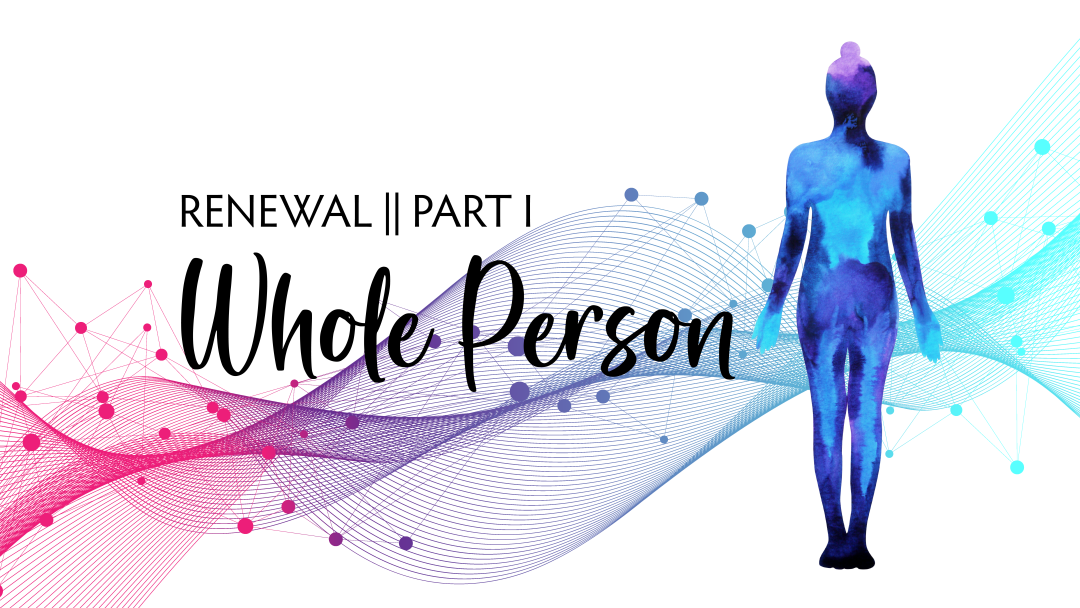
Several years ago, a friend had a health incident. I met with them after a follow-up appointment. With astonishment, they relayed what their doctor told them, “We are whole people. All the parts of the person are interconnected.” Now this may seem obvious, so there should be no need for a doctor to have to explain this to an adult person.
Before you are too hard on my friend, consider how you deal with issues in your life.
In general, when we have a physical issue, we go to the doctor and expect them to solve the physical issue, whether we are dealing with a stomach issue or chest pain. We don’t tend to consider that physical pain could be related to emotional issues we might be experiencing, like stress or depression. Yet, many people I know have returned from a doctor’s appointment upset, feeling unheard, and not cared for because the doctor suggested their pain was related to an emotional issue and a psychologist would help them more than the medical doctor could. The idea of being a whole person seems obvious, yet it is not something we consider when we are facing pain.
“Whole Person” and “holistic” are terms that you may see more now than before. It can be found in the medical world, with terms like holistic healing or holistic practice. It is popping up more in business articles that advise how to be a better leader by seeing those you lead holistically. In other words, as a person with more in their life than work. In mental health, there are words like “psychosomatic” which means an emotional condition has physical manifestations. In the Word, we have verses that suggest the same.
Be merciful to me, Lord, for I am in distress; my eyes grow weak with sorrow, my soul and body with grief. My life is consumed by anguish and my years by groaning; my strength fails because of my affliction, and my bones grow weak.
Psalm 31:10 NIV
When I refused to confess my sin, my body wasted away, and I groaned all day long. Day and night your hand of discipline was heavy on me. My strength evaporated like water in the summer heat.
Psalm 32:3-4 NLT
A joyful heart is good medicine, but a crushed spirit dries up the bones.
Proverbs 17:22 ESV
The emotional pain expressed in these verses manifests in the person’s body. Weakness, fatigue, and exhaustion are conveyed by the writers. The psalmist brings in another aspect of a person, the spirit. The Greeks held the understanding that although the body and the spirit were different neither could exist apart from the other.1 As Christians, we understand that the spirit is the part of the person that connects to God. In other words, our spirit is where God’s Spirit does His work to change us into the person He has ordained us to be. Our spirit is essential. Without God’s Spirit working in our spirit nothing in our life will bring Him glory.
This is the time many of us think about change. We want to be healthier. We strive to be more disciplined. We plan to achieve more at work. We organize our homes and workspaces to be more efficient in all we do. We have great plans for the new year.
If we were honest, we don’t always consider that we need God to make the changes we seek. Neither do we always consider that the change in one aspect requires changes in other areas. For instance, if we want to be physically healthy, we don’t always consider that we might need to address the emotional issues we have been avoiding. Very few of us realize that being healthy physically and emotionally requires that we allow God to control all of who we are.
This month the writers of The Deep Well blog will address various aspects of the person; physical, emotional, and mental. They will approach each with the understanding that God’s Spirit must connect with your spirit if you plan to be healthy in that area. As you journey with us this month, don’t lose sight of the fact that every aspect of your person is interconnected. As you shift in one area, other areas will be affected.
As John Wesley shepherded people, he would ask several questions to help them in their spiritual growth and walk. So, I present this question to you—how is your soul? Take some time to run a diagnostic check on yourself.
Here are some questions to get you started:
- How is your relationship with God? Might you have hidden fear, shame, disappointment, or anger with God?
- How is your mental health? Do you make sound decisions, possess self-discipline, and are able to handle unexpected change well?
- Are you emotionally healthy? Do you handle and express your emotions appropriately?
- Does your body need some attention? Maybe you are overdue for a trip to a medical professional or a trip to the gym.
FOOTNOTES
1 Robert H. Gundry, “Flesh and Spirit,” ed. Mark Allan Powell, The HarperCollins Bible Dictionary (Revised and Updated) (New York: HarperCollins, 2011), 290.

